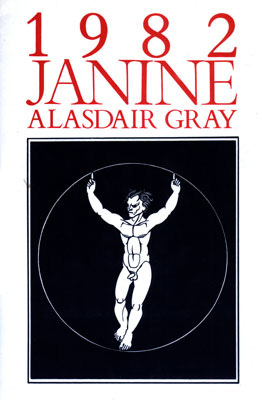Salutations, bibliophiles.
Today, I’m very excited to bring you
.Mazin writes
, where it’s his mission to champion artworks as artworks, to work out what makes a particular artwork good. If you’re looking for a place to start, you might want to check out his defence of the novel London Fields, or his case for Ursula Le Guin against Avatar.Here, Mazin does just that in his look at the book that made him — 1982, Janine by Alasdair Gray. Enjoy!
—
I once had a pre-friend — somebody in my network but not yet somebody with whom I shared a one-to-one bond — who was a curmudgeon. His usernames either rhymed with his surname to incorporate the word ‘scowl’ or were variations on ‘bastard’. We became real friends as tends to happen: without either side quite noticing, even as the grading-across is made out of a hundred-and-one laughs and talks, the importance of which is only noticeable looked at backwards, friendship’s footprints.
Sometimes though a moment stands out in real-time. Not when you crossed into being friends but when you realised you already were. At some point during a party at my place I’d pressed on him a couple of novels by Scottish author Alasdair Gray. While he was getting ready to leave, I found them under the sofa, forgotten or maybe even secreted there.
I don’t blame him! The imposition of pushing your tastes on others! The weird repulsion of those books lent to us! The social minefield of giving in to the guilt and reading them but then having to report back! In any case, I helpfully reunited him with the novels before he could escape.
It was to my double surprise that he a) didn’t join in the mutual pretence that a book exchange had ever occurred but returned the novels shortly and b) reported back that they’d been devastating. He’d liked Lanark well enough; but it was 1982, Janine that, in his own words, had had him sobbing. It’d broken through, then, to at least this one curmudgeon. If books make us, it doesn’t have to be because they shake our world-view or shift our fate. It can simply be because they make you friends.
Someone loving a book you love, understanding it in the same way — especially one that scours the psyche — is as intimate as sex. And few books feature more sex and the psyche than 1982, Janine. It’s a night-in-the-life novel, about an aging security engineer Jock McLeish (he’s Scottish in case that wasn’t clear) who drinks himself silly and suicidal in a hotel room while masturbating to an ongoing S&M fantasy. An ongoing fantasy or extended metaphor: it keeps getting interrupted by, or revealing itself to be, his memories about lost love: for his mother and father, his first girlfriend Denny, his best friend Alan—for his own squandered self.
It was always brave for Alasdair Gray to follow up his critic-wowing debut novel Lanark with one that takes as its theme the British insult of ‘a load of old wank’. And it’s understandable why such a novel might be a hard sell for the uninitiated. Will Self’s intro to the novel warns them not to “be deceived by its come-hither appearance and easy way with words into believing that 1982, Janine will let you go before you have been shaken up.” Ever since it came out it’s been accused of, and defended from, accusations of pornography like that other inventive subaltern novel, Ulysses. (“Radioactive hogwash” one critic called it.) There’s a reason it devastated my friend.
Jock’s pornographnic fantasies always start with the Janine of the title: a memory of buxom movie star Jane Russell press-ganged into sadomasochist service. Yet Gray’s trip down mammary lane is nowhere as graphic as the Marquis de Sade before him and Brett Easton-Ellis after. For one, Jock’s fantasies tend to home back to his mother. (The first time he has sex it feels like a “homecoming”.) And while he dresses up all his fantasy women - belts, buckles, ways of keeping them contained, in bondage, pun intended - he can’t withstand the sight of any of them nude. Because beyond the novel’s forbidding subject matter, it’s about weakness and regret. Jock is like one of the soused loners from a Larkin poem, but where the bile leads back to the injured liver behind it.
Gray’s main trick with 1982, Janine was to have its protagonist reverse the usual psychic flow: Jock doesn’t sublimate sex into work as a security engineer, but brings work into his sex life. His fantasies aren’t feverish but clinical, with rules, organisation, soul-crushing institutions. They punish Janine for going above her station and reassert vindictive control. Because Janine is Jock in the end. Everyone in our fantasies is inevitably us, as scary as that is to admit. Through his fantasies about her, Jock reenacts wrongs done to him, punishes himself for wrongs he did to others (there’s a reason they call masturbation self-abuse). But then - and this is the real genius of the novel - it’s through his fantasies he might find a way to liberate her and so himself: “For twenty-five years my sexual daydreams and loneliness and drinking and work for National Security have propped each other up. Without the work the first three must increase until they destroy me. Could they fall into a looser order with room for something new to grow?”
Wittgenstein wrote that, “If anyone is unwilling to descend into himself because this is too painful, he will remain superficial in his writing… If you are unwilling to know what you are, your writing is a form of deceit.”
Gray was willing to descend, and he brought back writing both true and profound. In one flashback Jock recalls once standing up to power in the form of a school bully who happens to be his teacher, an act of courage that leaves his classmates “glad he existed in the world”. He resolves to make someone, anyone, feel that way towards him again. What better can any of us do? And when he sighs “Yahoohay” and concedes, “This has been an exhausting night, the longest of my life” I imagine more than a few readers will think, like him, on the next day coming: still free of any mistakes.
But truth, profundity, redemption is what school taught us to expect of literature. Yet, in my experience, the kind school taught was also oblique, restrained—for want of a better word bookish. What I never knew till I’d read Gray in my late teens was that novels could be transporting as well, meaning both moving and visionary. That they could make you feel the sort of awe I’d hitherto only felt in, and so expected from, music and films and comics.
It’s hard though to write about the transporting climax of 1982, Janine without diluting it, so I’ll write around it instead. Not in terms of content but impact, its so-called ‘Choir of Voices’ section is the literary equivalent of the star-gate sequence in 2001: A Space Odyssey. Gray, civic-minded democratic socialist that he was, respected his ordinary readers to keep up with his inventiveness, and at the same time he used it not to show off but connect with them most effectively yet readably. Emulating its courage, honesty and invention has been my greatest hope as a writer since I first read it. It’s a climax that might even make you believe - believe again, as it did me - in (a sort of) God. Talk about aiming high.
While 1982, Janine had its champions - at the New York Times, Jonathan Baumbach, father of Noah the filmmaker and co-writer of that other reclaimed sexist fantasy, Barbie - it got the sort of ‘difficult second album’ notices that might’ve crashed a career. To this day most people au fait with Gray have only read his first novel Lanark; and after Janine he didn’t write another substantial or well-received one till 1993’s Poor Things. Death’s grisly career-move did boost his profile a little - he was embalmed in praise by the First Minister of Scotland no less - but only four years since and the shelves in bookstores and libraries more and more run from Robert Graves to John Green with not a spot of Gray between. Lanark might linger a while in university courses on Scottish literature; but what’s to become of the novel he himself considered his best?
The release of a film adaptation of Poor Things starring Emma Stone will hopefully have roused interest in all his work. And last year was the 40th anniversary of Gray completing 1982, Janine. A good a time as any, then, to revive it—by pressing it on friends, writing about it here, dragging it out of the underworld shadows by giving it the blood of our attention. Because if there’s one thing we can do to repay the books that made us it’s to try and help make them back.
P.S. For more ways of getting your writing in front of new readers, consider becoming a paying subscriber today.








okay that first paragraph is one great introduction. good writing!